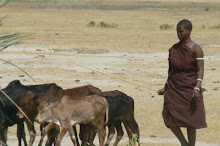Scientists have found that every language can be traced back to a long-forgotten dialect spoken by our Stone Age ancestors in Africa. The further away from Africa a language is spoken, the less distinct sounds - or phonemes - it has
Every language in the world - from English to Mandarin - evolved from a prehistoric 'mother tongue' first spoken in Africa tens of thousands of years ago, a new study reveals.
After analysing more than 500 languages, Dr Quentin Atkinson found compelling evidence that they can be traced back to a long-forgotten dialect spoken by our Stone Age ancestors.
The findings don't just pinpoint the origin of language to Africa - they also show that speech evolved at least 100,000 years ago, far earlier than previously thought.
British evolutionary scientists last night welcomed the study and said it shed light on one of most important moments in human evolution
There is now compelling evidence that the first modern humans evolved in Africa around 200,000 to 150,000 years ago.
Around 70,000 years ago, these early humans began to migrate from the continent, eventually spreading around the rest of the world.
Although most scientists agree with this 'Out of Africa' theory, they are less sure when our ancestors began to talk.
Some have argued that language evolved independently in different parts of the world, while others say it evolved just once, and that all languages are descended from a single ancestral mother tongue.
Dr Atkinson, of Auckland University, has now come up with fascinating evidence for a single African origin of language.
In a paper published today in Science, he counted the number of distinct sounds, or phonemes, used in 504 languages from around the world and charted them on a map.
The number of sounds varies hugely from language to language. English, for instance has around 45 sounds, some languages in South America have fewer than 15, while the San bushmen of South Africa use a staggering 200.
Dr Atkinson found that the number of distinct sounds in a language tends to increase the closer it is to sub-Saharan Africa.
He argues that these differences reflect the patterns of migration of our ancestors when they left Africa 70,000 years ago.
Languages change as they are handed down from generation to generation.
In a large population, languages are likely to be relatively stable - simply because there are more people to remember what previous generations did, he says.
But in a smaller population - such as a splinter group that sets off to find a new home elsewhere - there are more chances that languages will change quickly and that sounds will be lost from generation to generation.
Professor Mark Pagel, an evolutionary biologist at Reading University, said the same effect could be seen in DNA.
NUMBER OF PHONEMES IN LANGUAGES AROUND THE WORLDPhonemes are the distinct sounds used in 504 languages from around the world. The number of sounds varies hugely from language to language.
The number of distinct sounds in a language tends to increase the closer it is to sub-Saharan Africa, according to the study.
Piraha 11 - Brazil
Hawaiin 13 - Hawaii
Roro 14 - Papua new Guinea
Bandjalang 16 - Australian
Japanese 20 - Japan
Bodo 21 -Tibet
Warao 21 - Venezuela
Inuit 22 - Greenland
Tagalog 23 - Philippines
Farsi 30 - Iran
Korean 32 - Korea
Mandarin 32 - China
French 37 - France
Russian 38 - Russia
Bengali 43 - Bengal
English 46 - UK
Kurdish 47 - Iraq
Igbo - 59 Nigeria
Dahalo 59 - Kenya
Hadza 62 - Tanzania
Irish 69 - Ireland
Archi 91 - Dagestan, Russia
Xu 141 - South Africa

















.png)






3 comments:
somtimes i fail to understand if u r a fashion or a news blogger
Oops!i'm sorry if you don't understand,it's latest fashion/news or anything just to keep people occupied,there r some people they likes to read news,funny or sad story,there some people loves fashion only,so that's why everyday i post something different.
So please,what your opinion? Any idea please? if you have please don't hesitant,your most welcome.
separate the two and label them...news and fashion..different section...but i like ur news
Post a Comment